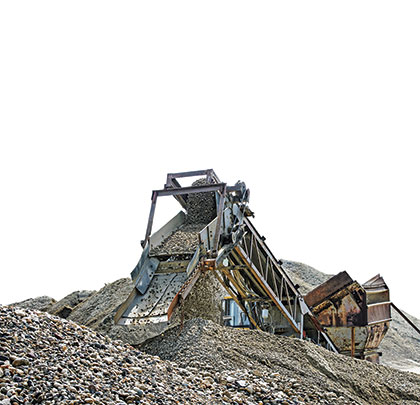Across the southeastern United States many producers are working to provide a steady and reliable supply of stone aggregate. As the area’s population grows so does demand for aggregate, which is a primary component for many types of construction as well as road building and maintenance.
Aggregates are increasingly being used in environmental applications as well. Aggregates are critical components of soil erosion–control programs and can be found in water purification systems and are used to reduce sulfur dioxide emissions from electric power plants.
There are numerous sources for aggregate. Traditionally it has been quarried from bedrock deposits of limestone, granite, marble or other stone. In areas where bedrock doesn’t exist, sand and gravel are mined. Increasingly, recycled materials are used for aggregate—reclaimed asphalt pavement, blast and steel furnace slag, and reclaimed concrete, to name a few.
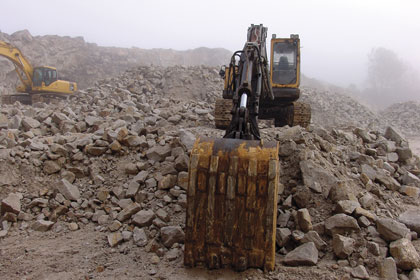
Aggregate from bedrock deposits are classified as hard, medium-hard and soft. After it’s harvested, quarry rock is processed, which involves crushing, screening and cleaning. Massive stones are sent along a vibrating feeder from the feed bin to a jaw crusher for rough crushing. The smaller rock is then transferred by conveyor to a cone or impact crusher for secondary crushing. The fine crushed stones are transferred to a vibrating screen for separation by size. Stones that meet the specific requirements of the finished product are transferred to a finished products pile. The remaining stones are sent back to be crushed again. Dust removing equipment is often used as an additional environmental protection.
Once processed to the client’s specifications, the aggregate is stored to maintain its integrity and cleanliness until use. Clean rock produced in various sizes has many uses, including the production of asphalt, cement, and seal coating.
Oldcastle Materials Group is the leading vertically integrated supplier of aggregates, asphalt, ready-mixed concrete, and paving services in the United States, annually producing 165 million tons of aggregates, 50 million tons of asphalt, and 10.5 million cubic yards of ready mixed concrete at 1,400 locations nationwide. Oldcastle is the fourth largest aggregate producer in the United States and the largest producer of asphalt products.
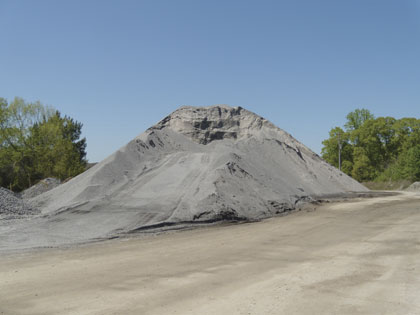
Midsouth Aggregates, part of Oldcastle Materials, produces aggregates by quarrying naturally occurring rock deposits. Granite and limestone are extracted by carefully controlled blasting, then crushed and graded to produce stones of different sizes that are used in various applications—from concrete, wall board and roofing tiles to roads and bridges.
Shane Horton, plant manager for Midsouth Aggregates’ Alexander City, Alabama, quarry operation needed to replace a submersible pump that pumped quarry water to a stone washing tower. He also wanted to increase the discharge flow of the pump. The existing pump had a 4-inch discharge. The new pumping conditions were 1000 gallons per minute, 50 feet of vertical lift and 500 feet of horizontal run to the water tower. The manufacturer of the existing pump would have to use a pump with an 8-inch discharge in order to meet the new conditions; BJM could accomplish the job with a 6-inch KZN.
Scott Morrow, sales engineer for Brownlee-Morrow, a dynamic fluids transfer distributor specializing in pumping equipment, suggested a BJM Pumps submersible built specifically for hard to handle rock slurries.
Midsouth Aggregates didn’t have any experience with BJM submersibles, so Morrow provided information on the BJM KZN hard metal slurry pump. Specifically, Scott suggested the BJM KZN220-30 HP high head, hard metal agitator slurry pump. Because of BJM’s wide experience in pumping coal slurries, line slurries and a variety of abrasive products found in wash down sumps, Midsouth Aggregates decided to give the pump a try.
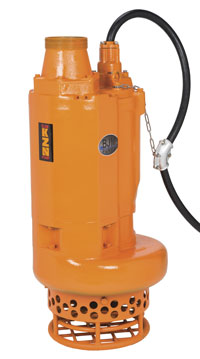
The quality features built into BJM’s KZN slurry pump series were also factors in the decision and include the following:
- Optimum Wear Resistance. All wetted parts are constructed of abrasive resistant 28 percent chrome iron (600 Brinell, 71 Rockwell C) for maximum wear life. In addition, a replaceable hardened wear plate is located on the suction side, where erosion would cause a loss of pump performance.
- Maximum Solids Handling Capability. An integral agitator fluidizes settled solids into a slurry making them easier to pump with less chance of clogging. The semi-open impeller handles abrasive solid concentrations as high as 70 percent by weight.
Also weighing into the decision was the fact that the KZN slurry pump achieves maximum service life because of numerous design features such as:
- Class H motor insulation and built in amperage (FLA) and temperature overload protection;
- Double silicon carbide mechanical seals in a separate oil filled seal chamber;
- Heavy duty lip seal that provides additional protection for the mechanical seals;
- Stainless steel shaft and shaft sleeve that provide maximum wear and corrosion protection;
- Pump volutes cast from hardened ductile iron (300 Brinell hardness), which is twice as abrasive resistant as standard ductile iron with walls that are extra thick at the point where pumped slurry enters the discharge.
Another key part of the pump construction is the semi-open impeller. Also made of 28 percent chrome the slurry impeller must have the ability to work in tandem with the agitator to pass the aggregate through the pump and out the discharge. The agitator’s ability to keep solids suspended in the fluid being pumped, as well keep the suction clear of clogs greatly aids the pumping action.
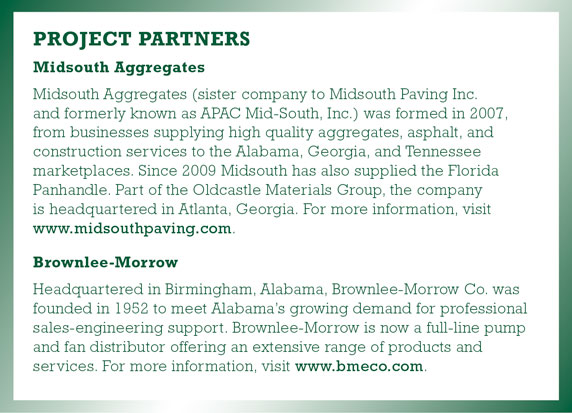
Additionally, Midsouth Aggregates liked the BJM vertical top discharge feature of the KZN220 agitator pump. The existing submersible pump in Midsouth Aggregates’ application was a side discharge 90 degree elbow pipe that had a high wear area on the 90 degree turn. BJM’s vertically positioned top discharge KZN promotes optimum wear resistance along the discharge path as well as use of the fluid being pumped for natural cooling of the pump’s internal motor functions. BJM’s vertical design also allows for the sump to be pumped down to within inches of the bottom.
Further, the vertical discharge and the 22.75-inch diameter of the KZN220 creates a space saving footprint and allows installation in the tightest of manholes.
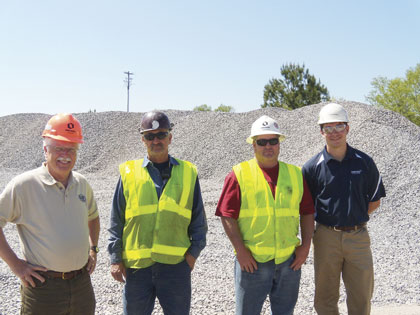
Left to right: Kelly McCollum, BJM Pumps southern regional sales manager, Richard Smith, Midsouth Aggregates, Shane Horton, Midsouth Aggregates Alex City plant manager, and Scott Morrow, sales engineer for Brownlee-Morrow.
Based on the high volume and harsh conditions of their Alexander City quarry operation, Midsouth Aggregates was seeking a submersible pump that delivered reliability to the operation’s stone washing tower. Brownlee-Morrow recommended and supplied a BJM KZN220 submersible pump that delivered what Midsouth Aggregates was looking for.
For More Information
Mike Bjorkman is vice president of BJM Corp. and has more than thirty years of experience in the pump industry. He serves as director of marketing and IT for BJM Pumps, LLC and All Test Pro, LLC. Both companies are subsidiaries of BJM Corp. Mike can be reached at 860.399.5937. BJM Pumps, established in 1983, supplies electrical submersible pumps to industrial and municipal markets throughout the United States, Canada, and South America. BJM Corp. For more information, visit www.bjmpumps.com.
____________________________________________
MODERN PUMPING TODAY, October 2016
Did you enjoy this article?
Subscribe to the FREE Digital Edition of Modern Pumping Today Magazine!



